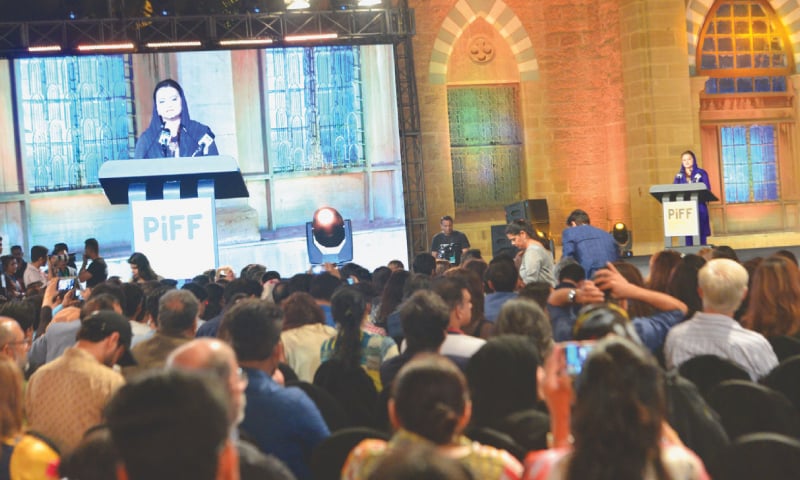KARACHI: The Pakistan International Film Festival (PIFF) aimed to bring international film-makers and their work to Pakistan and create an interactive space for exchange of ideas.
To become the largest film festival in the country, the month of March was dedicated to holding workshops, mobile screenings, seminars, award ceremonies, and musical nights to provide the city of Karachi with a flavour of both local and international film industries.
It all culminated on Sunday night at the Frere Hall Gardens where the closing ceremony was held amid fanfare and celebration.
Minister of State for Information and Broadcasting Marriyum Aurangzeb was present at the event as the chief guest.
Individuals making a mark in the industry recognised with awards
“Artists have a huge role in portraying a positive image of their country and promoting tolerance in the society. I would like to appreciate the Karachi Film Society (KFS) for hosting the PIFF and congratulate the participants for making this festival a huge success,” she said.
In her speech, Ms Aurangzeb spoke about the integral role of the government in facilitating artists from across the border to collaborate and allow people to communicate with each other.
“It it through art and culture, sports and film that we can fight Pakistan’s negative perception in the world,” she said. Pakistan experienced very tumultuous times, and as a result, the artists went quiet and extremism and intolerance increased, she regretted.
“Pakistan’s film policy, the finances and interventions as proposed by the government of Pakistan will allow a revival of the film industry,” said the federal minister.
KFS president Sultana Siddiqui shared her excitement at the closing ceremony and promised that the festival would grow larger and become more inclusive over the years.
“This festival would not have been possible without the presence of the foreign delegates, the culture department of the Sindh government, ministry of information of the federal government, founding members of KFS, the entertainment fraternity and everyone who trusted our vision and supported us. I hope that this collective effort grows in the following years,” she said.
The night was also dedicated to those who had made a mark in the film industry in the past few years and awards were handed to the winners selected by a jury.
With regards to documentaries screened at the festival, the award for Best Film (Short) went to Aghai Nazem from Iran; Best Documentary (short) to Veil Done from India; and Best Documentary Feature to The Rebel Optimist from Pakistan.
Lala Begum by Mehreen Jabbar won in the category of Best Feature Film.
Best Film was given to Punjab Nahi Jaungi, with the movie picking up other awards in different categories. The film’s director Nadeem Baig was awarded Best Director, and Khalil ur Rehman Qamar was Best Writer.
In the music category, the Best Music award went to Sahir Ali Bagga for Arth-The Destination. The Best Cinematography award was given to Rana Kamran for Na Maloom Afraad 2 and the Best Editor was Mitesh Soni for Janaan.
As for the actors, the award for Best Debut went to Ali Rehman and Hania Amir for Janaan. Best Actor (Male) was Fahad Mustafa and Best Actor (Female) went to Mehwish Hayat for Actor in Law.
Unfortunately, there were several mix-ups during the award ceremony with most of the presenters announcing incomplete names as well as not being aware of the winners. This resulted in a lot of confusion.
One particular shocking moment took place when the award for best documentary feature was given to Perween Rahman: The Rebel Optimist. When director Mahera Omer came onstage to receive the award, the presenter erroneously referred to her as Perween. Needless to say, many in the crowd were very upset at this.
The four-day festival comprised panel discussions on the different subjects related to film. Apart from panel discussions and workshops that targeted the future generation of film-making in Pakistan, there were a total of eight movie premieres — Cake, The Valley, Lala Begum, Moomal Rano, Zaraab, The Song of Scorpions, Kuch Bheege Alfaaz and The Wishing Tree.
The closing ceremony marked the end of the film festival which was being held under the patronage of KFS, which is a non-profit organisation and parent body of the Pakistan International Film Festival, founded by renowned producer and director, Sultana Siddiqui.
The event also featured live performance of Sufi music maestro Abida Parveen and a fashion showcase.
Published in Dawn, April 3rd, 2018












































Dear visitor, the comments section is undergoing an overhaul and will return soon.